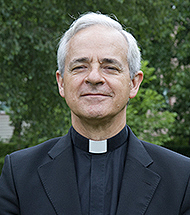News
LATEST NEWS AND EVENTS FROM THE SCHOOL OF ENGINEERING
"meeting with God"
The chaplain of Tecnun, Don Emilio Fuertes, writes a article on the occasion of the 90th anniversary of the founding of Opus Dei.

We reproduce below the article opinion published in EL DIARIO VASCO by the chaplain of Tecnun, Mr. Emilio Fuertes, on the occasion of the 90th anniversary of the founding of Opus Dei.
"October 2, 2018 marks the 90th anniversary of the founding of Opus Dei. On the same day in 1928, in Madrid, Josemaría Escrivá began to promote this new institution of the Catholic Church. Now, 90 years later, Opus Dei has precisely 90,000 members. On that day Josemaría Escrivá ended eleven years of waiting, searching, inquiring and asking God insistently: "Lord, make me see what you want of me". From the age of 15 he had wanted to know how to respond to the great restlessness that God had placed in his life. Josemaría Escrivá knew this, when he was already a priest, at the age of 26.
His human, spiritual and professional maturity was forged during those eleven years, from the age of 15 to 26, an essential time in the formation of a person. He studied Civil Law, and Philosophy and ecclesiastical theology. He worked intensely as a teacher and as a priest: formator at seminar room in Zaragoza, parish priest of a village, priest attending to the sick, helping other priests, preparing hundreds of children for First Communion. Eleven years in which he suffered much pain, loneliness, the death of loved ones, and a great economic poverty that he was unable to conceal. Eleven years of human and spiritual maturity.
And then, that day, during a prayer and retreat at conference in Madrid, Opus Dei appeared: "I received," he wrote, "enlightenment about the whole Work, while I was reading those papers (which contained notes of his prayer of those past years). Moved, I knelt down - I was alone in my room, between talks - and gave thanks to the Lord.
What was the focus of this enlightenment? That ordinary life - work, relationships with family and friends, daily struggles, worries, etc - has to be the place of meeting with God, the place of sanctification... to be someone who leaves a trace in the world and that the better is not only for a chosen few. "The divine ways of the earth have been opened...", he often repeated. It is necessary to "make hendecasyllables -heroic verses- out of everyday prose," he said to explain this idea. The ideas of the Gospel are fully up to date; it is a matter of applying today the essential ideas of the Gospel without sweetening them....
In his words, this is the central message: My children, there where your brothers and sisters are, there where your aspirations, your work, your loves are, there is the place of your daily meeting with Christ. It is in the midst of the most material things of the earth that we must sanctify ourselves, serving God and all men.
Taking God seriously in daily life fills us with joy, pushes us to serve, requires us to work very well... without sweetening the message of Jesus. As one writer jokingly put it: "if the Catholic religion were the opium of the people, as Marx insisted, Opus Dei would be pure heroin".
When asked why he had founded Opus Dei, Josemaría Escrivá often replied that he was not a founder, he was an instrument, and he was deeply convinced that God used him - sinful and full of errors - as a disproportionate tool.
In these 90 years some fundamental events have taken place: the death of the founder in 1975, his canonization in 2002, the beatification of his successor, and the approval as a Prelature staff of the Catholic Church in 1982. In this time it has reached the five continents, and is firmly anchored in countries such as the United States, Mexico, Nigeria and Australia.
Opus Dei has been present in San Sebastian since 1955, and some well-known Donostians joined the Work during these years, such as Jesús Urteaga (a very popular priest at the time, now deceased), José Luis Olaizola (a well-known novelist and author) and the athlete Pipe Areta, an Olympian in Rome and Tokyo and national record holder in the triple jump for many years. The Ayete and Jaizkibel Colleges, and the Engineering School of the University of Navarre (Tecnun) are some of the institutions that are the fruit of Opus Dei's activity in San Sebastian.
The life of an institution is like the course of a river. It begins with flashy and jumping jumps, to give way to the serenity of the middle course, some stages of meandering and occasional high jumps in which the water rushes with force. Opus Dei is approaching its first centenary through a post-Christian culture that does not seem to need either God or the Church. What then is its mission statement? Can it contribute anything? It can contribute that hopeful, excited and demanding vision of Christ's message in ordinary life. It can help people to turn ordinary life, today's prose, into heroic hendecasyllables full of joy and service.
